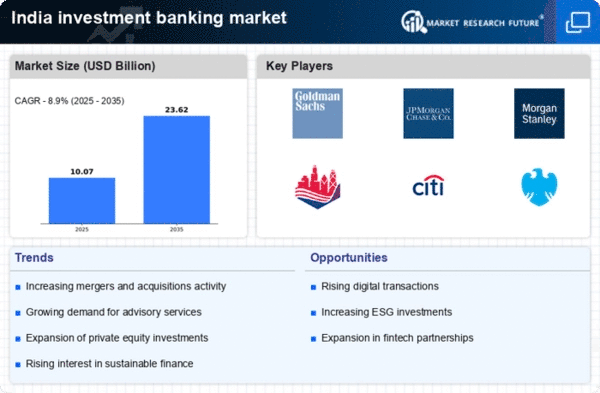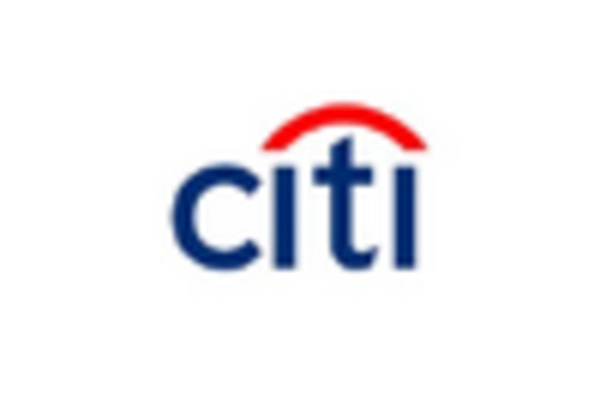Growing Demand for Equity Financing
The investment banking market in India is witnessing a surge in demand for equity financing, particularly among startups and mid-sized enterprises. As of November 2025, the Indian equity market has shown resilience, with a market capitalization exceeding $3 trillion. This growth is attributed to a favorable investment climate and increased investor confidence. Investment banks are actively engaged in underwriting initial public offerings (IPOs) and facilitating private placements, which are essential for companies seeking to raise capital. The trend towards equity financing is likely to continue, as businesses recognize the advantages of accessing public markets for growth. This shift not only enhances the capital structure of firms but also contributes to the overall dynamism of the investment banking market, as banks adapt their services to meet the evolving needs of clients.
Expansion of Foreign Direct Investment
The investment banking market in India is benefiting from a significant increase in foreign direct investment (FDI). In 2025, FDI inflows are expected to surpass $100 billion, driven by India's favorable regulatory environment and economic reforms. This influx of capital presents numerous opportunities for investment banks, as they facilitate cross-border transactions and provide advisory services to foreign investors. The growing interest from international firms in the Indian market is likely to enhance the role of investment banks in structuring deals and navigating regulatory complexities. Furthermore, the expansion of FDI is expected to stimulate domestic companies to seek partnerships and collaborations, thereby further invigorating the investment banking market. This trend underscores the importance of investment banks in connecting global capital with local opportunities.
Rising Mergers and Acquisitions Activity
The investment banking market in India is currently experiencing a notable increase in mergers and acquisitions (M&A) activity. This trend is driven by various factors, including the need for companies to consolidate resources and enhance competitive advantages. In 2025, the total value of M&A transactions in India is projected to reach approximately $50 billion, reflecting a robust appetite for strategic partnerships. Investment banks play a crucial role in facilitating these transactions, providing advisory services and capital raising solutions. As companies seek to expand their market presence, the demand for investment banking services is likely to grow, thereby strengthening the overall investment banking market. Furthermore, the increasing involvement of private equity firms in M&A deals is expected to further stimulate this sector, indicating a vibrant landscape for investment banking activities.
Increased Focus on Financial Advisory Services
In the current landscape, the investment banking market in India is experiencing a heightened emphasis on financial advisory services. Companies are increasingly seeking expert guidance on strategic decisions, including capital structure optimization and risk management. The demand for advisory services is projected to grow by approximately 15% annually, as firms navigate complex financial environments. Investment banks are positioning themselves as trusted advisors, leveraging their expertise to provide tailored solutions. This trend is indicative of a broader shift towards value-added services within the investment banking market, where clients prioritize strategic insights over traditional transactional roles. As businesses face evolving challenges, the ability of investment banks to offer comprehensive advisory services will likely enhance their competitive positioning in the market.
Technological Advancements in Financial Services
The investment banking market in India is currently undergoing a transformation driven by technological advancements. The integration of fintech solutions is reshaping how investment banks operate, enhancing efficiency and client engagement. As of November 2025, it is estimated that over 60% of investment banks in India are adopting digital platforms for transaction processing and client interactions. This shift not only streamlines operations but also allows banks to offer innovative products and services. The rise of data analytics and artificial intelligence is enabling investment banks to provide more personalized solutions, thereby improving client satisfaction. As technology continues to evolve, the investment banking market is likely to see increased competition, with firms that leverage these advancements gaining a competitive edge.
















